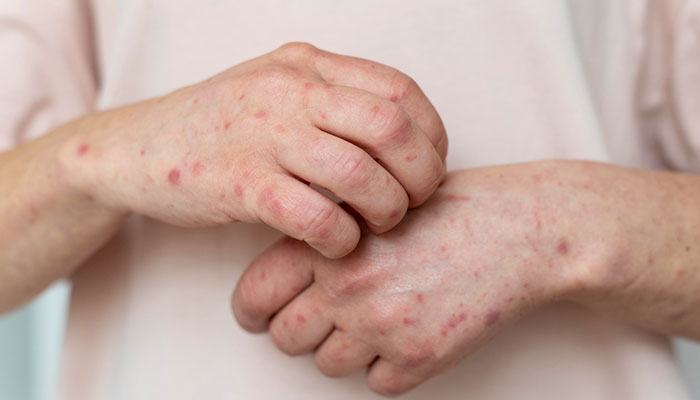Atopic dermatitis, also known as eczema or eczema dermatitis is a chronic skin condition characterized by inflammation, discolouration, and irritation of the skin. It is a widespread condition that is usually diagnosed in infancy; however, individuals can develop atopic dermatitis at any age.
Signs and Symptoms of Atopic Dermatitis
- Itchy skin
- Dry and cracked skin
- Rashes on swollen skin
- Small, raised bumps, on brown or Black skin
- Thickened skin
- Darkening of the skin surrounding the eyes
- Raw, sensitive skin due to scratching
Causes of Atopic Dermatitis
Atopic dermatitis is a condition where the skin loses moisture due to changes in its protective layer. It occurs due to bacterial infections, mutations in genes, changes in the immune system, and exposure to certain environmental factors.
Understanding Atopic Dermatitis in Ayurveda
Ayurveda, an ancient system of medicine, attributes atopic dermatitis to an imbalance in the body’s doshas, particularly Vata and Kapha. The root causes are often linked to dietary factors, stress, and exposure to allergens. Consuming foods that aggravate Vata and Kapha, such as dairy, excessive sweets, and fried items, can trigger the condition.
Treatment and Management
Treatment may involve allergen avoidance, medications like antihistamines, nasal corticosteroids, or topical creams, and lifestyle modifications to manage symptoms and prevent flare-ups.
Palliative Care provided by SGP’s PSA aims to improve the overall quality of life for individuals with atopic dermatitis by addressing their physical, emotional, and social well-being throughout the disease progression. It works in conjunction with other treatment options to ensure a comprehensive approach to symptom management and comfort.
FAQs about Atopic Dermatitis
-
No, atopic dermatitis does not spread from one person to another. However, it does cause the skin to be extremely itchy, which in turn leads to redness and swelling, as well as cracking and scaling of the skin.
-
Atopic dermatitis often begins in childhood, it can persist into adulthood or develop in adulthood for some individuals. It is not limited to children, as some individuals may develop the condition in their later years.
-
Atopic dermatitis is associated with a higher prevalence of female and male infertility, regardless of the degree of severity of symptoms.
-
Yes, weather changes, particularly cold and dry conditions, can trigger or exacerbate atopic dermatitis symptoms. Proper moisturization is essential during such weather to maintain skin hydration.
-
Flare-ups of atopic dermatitis can be triggered by various factors, including stress, certain fabrics, soaps, foods and exposure to allergens or irritants. Identifying and avoiding triggers is essential in managing the condition.






